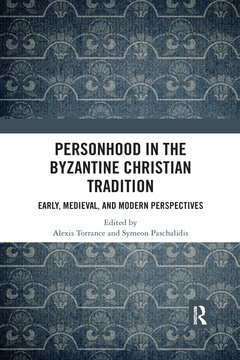Description
Personhood in the Byzantine Christian Tradition
Early, Medieval, and Modern Perspectives
Coordinators: Torrance Alexis, Paschalidis Symeon
Language: English
Subject for Personhood in the Byzantine Christian Tradition:
Keywords
Gauguin; Paul Gauguin; Christos Karakolis; Byzantine Christian Tradition; Damaskinos (Olkinuora); Key Secondary Objective; Demetrios Harper; Christos Yannaras; Evan Freeman; Gregory Palamas; Jean-Claude Larchet; Nicholas Cabasilas; Johannes Zachhuber; Modern Orthodox Theology; Marie-HNe Congourdeau; Byzantine Hymnographic; Mary B; Cunningham; Personal Moral Identity; Matthew C; Briel; Nikos Nissiotis; Nicholas Loudovikos; Gennadios Scholarios; Nicolas Prevelakis; Contemporary Orthodox Theology; Nikolaos Asproulis; Greek Orthodox Theologian; Paul M; Blowers; Existentialist Philosophy; Symeon Paschalidis; Cappadocian Fathers; Typological Imagery; Dialogical Reciprocity; Trinitarian Theology; Orthodox Personalism; John Philoponus; Vincent Van Gogh; Idealized Parental Imago; Creaturely Existence; Human Hypostasis
Publication date: 06-2020
· 15.6x23.4 cm · Paperback
Publication date: 04-2018
· 15.6x23.4 cm · Hardback
Description
/li>Contents
/li>Biography
/li>
Bringing together international scholars from across a range of linked disciplines to examine the concept of the person in the Greek Christian East, Personhood in the Byzantine Christian Tradition stretches in its scope from the New Testament to contemporary debates surrounding personhood in Eastern Orthodoxy. Attention is paid to a number of pertinent areas that have not hitherto received the scholarly attention they deserve, such as Byzantine hymnography and iconology, the work of early miaphysite thinkers, as well as the relevance of late Byzantine figures to the discussion. Similarly, certain long-standing debates surrounding the question are revisited or reframed, whether regarding the concept of the person in Maximus the Confessor, or with contributions that bring patristic and modern Orthodox theology into dialogue with a variety of contemporary currents in philosophy, moral psychology, and political science.
In opening up new avenues of inquiry, or revisiting old avenues in new ways, this volume brings forward an important and on-going discussion regarding concepts of personhood in the Byzantine Christian tradition and beyond, and provides a key stimulus for further work in this field.
Introduction, Alexis Torrance and Symeon Paschalidis Section I– Ancient Christian, Early Byzantine 1 Personal relationship as a prerequisite for moral imitation according to the Apostle Paul, Christos Karakolis 2 Emotional "scripts" and personal moral identity: insights from the Greek Fathers, Paul M. Blowers 3 Personhood in miaphysitism: Severus of Antioch and John Philoponus, Johannes Zachhuber Section II– Early to Middle Byzantine 4 Hypostasis, person and individual according to St Maximus the Confessor, with reference to the Cappadocians and St John of Damascus, Jean-Claude Larchet 5 Mary, the Mother of God, in dialogue: the drama of personal encounter in the Byzantine liturgical tradition, Mary B. Cunningham 6 Personification in Byzantine hymnography: kontakia and canons, Damaskinos Olkinuora Section III– Late Byzantine 7 The exemplar of consubstantiality: St. Gregory Palamas’ hesychast as an expression of a microcosmic approach to personhood, Demetrios Harper 8 Nicholas Cabasilas of Thessaloniki: the historical dimension of the person, Marie-Hélène Congourdeau 9 Freedom, necessity and the laws of nature in the thought of Gennadios Scholarios, Matthew C. Briel Section IV– Modern 10 Flesh and Spirit: divergent Orthodox readings of the iconic body in Byzantium and the twentieth century, Evan Freeman 11 Nikos Nissiotis, the "theology of the ’60s" and personhood: continuity or discontinuity? Nikolaos Asproulis 12 Eastern Christian conceptions of personhood and their political significance, Nicolas Prevelakis 13 Consubstantial Selves: a discussion between Orthodox personalism, existential psychology, Heinz Kohut, and Jean-Luc Marion, Nicholas Loudovikos
Alexis Torrance is Archbishop Demetrios College Chair of Byzantine Theology and Assistant Professor in the Faculty of Theology and the Medieval Institute at the University of Notre Dame.
Symeon Paschalidis is Professor of Patristics and Hagiography in the Faculty of Theology at the Aristotle University of Thessaloniki and the Director of the Patriarchal Institute for Patristic Studies in Thessaloniki.




